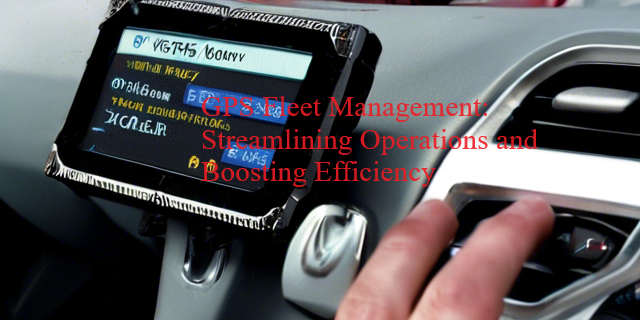Navigated Table of Contents
GPS Fleet Management: Streamlining Operations and Boosting Efficiency
GPS fleet management has revolutionized the way businesses manage their vehicle fleets. By leveraging advanced telematics technology, fleets managers can gain real-time visibility into their operations, optimize routes, monitor driver behavior, and improve overall efficiency.
In this blog post, we will explore the key features and benefits of GPS fleet management, as well as provide insights into the top providers in the industry.
In this blog post, we’ll be looking at the following contents:
What is GPS Fleets Management?
Key Features of GPS Fleets Management
Benefits of GPS Fleet Management
Top GPS Fleet Management Providers
What is GPS Fleet Management?
GPS fleet management involves the use of telematics devices that retrieve data generated by vehicles, such as GPS position, speed, engine faults, and fuel usage. This data is then sent to a cloud-based fleet management platform, where it can be analyzed and used to make informed decisions.
Key Features of GPS Fleet Management:
- Real-time Vehicle Tracking: GPS fleets management allows fleet managers to track the location of their vehicles in real-time, enabling them to monitor routes, optimize dispatching, and improve response times.
- Driver Behavior Monitoring: With GPS fleet management, fleet managers can monitor driver behavior, including speeding, harsh braking, and acceleration. This helps promote safer driving habits and reduces the risk of accidents.
- Route Optimization: By analyzing real-time data, GPS fleet management systems can suggest the most efficient routes for drivers, reducing fuel consumption and improving overall productivity.
- Maintenance and Diagnostics: GPS fleet management platforms provide insights into vehicle health, including engine faults and maintenance needs. This allows fleet managers to schedule preventive maintenance, reducing downtime and costly repairs.
- Fuel Management: GPS fleet management systems can track fuel consumption and identify inefficiencies, such as excessive idling or unauthorized fuel usage. This helps businesses reduce fuel costs and improve sustainability.
Benefits of GPS Fleet Management:
- Improved Efficiency: GPS fleets management enables businesses to optimize routes, reduce idle time, and improve overall fleet productivity. This leads to cost savings and increased customer satisfaction.
- Enhanced Safety: By monitoring driver behavior and providing real-time alerts, GPS fleet management systems promote safer driving habits and reduce the risk of accidents.
- Reduced Fuel Costs: With fuel management features, businesses can identify and address fuel inefficiencies, such as excessive idling or unauthorized fuel usage. This leads to significant fuel cost savings.
- Maintenance Optimization: GPS fleet management platforms provide insights into vehicle health, allowing businesses to schedule preventive maintenance and reduce costly repairs. This improves vehicle reliability and reduces downtime.
- Compliance and Reporting: GPS fleet management systems help businesses comply with industry regulations, such as electronic logging device (ELD) requirements. They also provide detailed reports on driver behavior, fuel consumption, and maintenance needs.
Top GPS Fleet Management Providers:
- Geotab: Geotab offers a comprehensive fleets management platform that provides real-time vehicle tracking, driver behavior monitoring, and maintenance insights.
- Samsara: Samsara‘s GPS fleet tracking software offers features such as real-time visibility, fuel management, and driver safety monitoring.
- Other notable providers include Verizon Connect, Fleetio, and Teletrac Navman.
Latest trends in GPS fleets management
Based on the search results for “Latest trends in GPS fleet managing development,” here are some key trends in GPS fleet management for 2024:
GPS is the norm, not the exception: According to the 2024 Fleet Technology Trends Report, nearly 3 out of 4 fleets (70%) use GPS tracking solutions to optimize fleet operations and promote safe driving practices. Fleets using GPS are achieving goals such as increased productivity, improved maintenance, improved customer service, improved routing, and reduced fuel consumption [1].
Video technology for cost reduction: The use of video technology, such as dashcams, has evolved beyond promoting safe driving practices. With the addition of outward-facing cameras and intelligent AI dashcam solutions, fleets can now use crash footage to protect themselves from false claims, reduce accident costs, and lower insurance costs. Dashcams also serve as effective tools for coaching employees to drive safely and prevent crashes [1].
Achieving more with existing resources: GPS technology is helping fleets achieve more with their existing resources.
By automating manual processes, improving routing, and using data to right-size the fleet, GPS tracking enables fleets to improve productivity, reduce drive time, fit more jobs into the workday, and eliminate unnecessary vehicle purchases. This trend is particularly beneficial in times of limited vehicle availability and increased competitive pressure [1].
Mobile technology and fleet managing apps: Fleet managing apps are playing a pivotal role in the industry, providing real-time tracking, route management, fuel management, maintenance tracking, compliance management, and driver performance analytics.
These apps are becoming more sophisticated, offering features like intelligent automation, user-friendly interfaces, enhanced security, integration with other technologies, and data-driven decision making [2].
Focus on cost savings and vehicle fleet: The Verizon Connect 2024 Fleet Technology Trends survey highlighted the importance of cost savings in fleet manager.
Fleet managers are looking for ways to optimize their operations and reduce expenses. This includes implementing technologies like GPS tracking, video technology, and fleet management apps to achieve cost savings and improve overall fleet efficiency [3].
Conclusion
GPS fleet management has become an essential tool for businesses looking to streamline their operations, improve efficiency, and reduce costs.
By leveraging real-time vehicle tracking, driver behavior monitoring, and maintenance optimization, businesses can achieve significant benefits such as improved productivity, enhanced safety, and reduced fuel consumption.
When choosing a GPS fleets manager provider, it is important to consider the specific needs of your business and select a solution that offers the right features and support.





